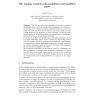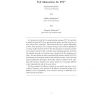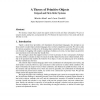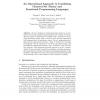115
click to vote
TACS
1994
Springer
15 years 6 months ago
1994
Springer
The ML type system was originally introduced as a means of identifying a class of terms in a simple untyped language, often referred to as core-ML, whose evaluation could be guaran...
146
click to vote
TACS
1994
Springer
15 years 6 months ago
1994
Springer
Abstract Interpretation for Control-Flow Analysis Yan Mei Tang and Pierre Jouvelot CRI, Ecole des Mines de Paris, France Effect systems and abstract interpretation are two methods ...
129
click to vote
TACS
1994
Springer
15 years 6 months ago
1994
Springer
In this paper we present a semantic theory for Concurrent ML. It consists of a new effect-based type system and a denotational model. The new type system is based on an extension o...
121
click to vote
TACS
1994
Springer
15 years 6 months ago
1994
Springer
In the A-calculus, there is a standard notion of what terms should be considered to be "undefined": the unsolvable terms. There are various equivalent characterisations o...
106
click to vote
TACS
1994
Springer
15 years 6 months ago
1994
Springer
traction for PCF1 Samson.Abramsky2 University of Edinburgh and Radha Jagadeesan3 Loyola University Chicago and Pasquale Malacaria4 Queen Mary and Westfield College An intensional m...
TACS
1994
Springer
15 years 6 months ago
1994
Springer
We introduce simple object calculi that support method override and object subsumption. We give an untyped calculus, typing rules, and equational rules. We illustrate the expressi...
116
click to vote
TACS
1994
Springer
15 years 6 months ago
1994
Springer
Abstract. We have designed a programming logic based on an integration of functional programming languages with classical set theory. The logic merges a classical view of equality ...




